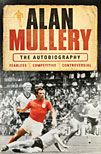 The Autobiography
The Autobiography
by Alan Mullery with Tony Norman
Headline, £18.99
Reviewed by Adam Powley
From WSC 239 January 2007
“Outspoken, controversial and entertaining”: so say the publishers in hyping the memoirs of Alan Mullery, adding the titillating prospect of naked blondes in hotels and “every human emotion”. Perhaps the current trend for football biogs replete with tales of mega-bungs, bling and bedroom antics has skewed the biographical template, but there’s little need for the Heat-style hard sell here.
Mullery comes across as a traditionalist, an adept and competitive player for England, Spurs and Fulham, a patchily successful manager at Brighton, QPR, Palace and Charlton. He never quite hit the superstar heights, but achieved more than many of his peers. His playing career belongs to that footballing transition between the post-war, Brylcreemed era and the rise of the pop-star player, straddling the end of the maximum wage. As such Mullery is emblematic of the time: diligent but not deferential, upwardly mobile without straying too far from his roots.
In his modern incarnation as a pundit, Mullery isn’t short of a forthright opinion that can occasionally grate, but his biography is an involving, considered, even fatalistic read about the ups and downs of football life. Recent downs have been particularly acute: Mullery’s admission that he contemplated suicide is a shock and is at odds with his image.
As a manager, with his mac and shades Mullers could pass for a hard-nosed character from The Sweeney. That tough-guy reputation is a recurrent theme. Mullery doesn’t exactly revel in the persona, but does little to dissuade readers of its accuracy. That status was questioned at Spurs, but once a fan nicknamed him “Tank” his self-worth was reaffirmed.
Mullery writes of his shame at being the first England player to be sent off, but the retaliation that prompted it, kicking his Yugoslavian assailant where it hurts, fits into his take-no-prisoners code. This in turn is a reflection of his upbringing in a pre-gentrified Notting Hill and early career at Fulham. It’s here that the book is at its sharpest, populated by characters with a tendency towards violence (including his father), for whom scores would invariably be settled with punch-ups. Even at genial Craven Cottage, a place he amusingly illustrates as being like an Ealing comedy set, there’s a fair share of fisticuffs.
The book is weakest in underwhelming accounts of internationals and some too familiar observations: Bobby Moore was a gent who liked a lager, Cloughie was a bit of a character and there’s yet another retelling of Rodney Marsh being pulled off by Alf Ramsey.
Thankfully, Mullery is candid enough to record flaws in those he admires, giving an interesting take on Bill Nicholson’s modus operandi, and he sheds some welcome light on the petty corruption of the times, from ticket-touting to a comically inept boot deal engineered by a less-than-trustworthy Alec Stock. Saints and sinners abound, even if the briefest of mentions of Mullery’s own conversion to the Christian faith could have been expanded upon. But this is a book about football, by a lover of football, and is none the poorer for that.